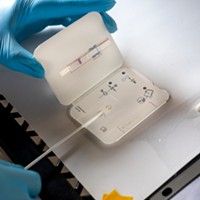[
{
"name": "Top Stories Video Pair",
"insertPoint": "7",
"component": "17087298",
"parentWrapperClass": "fdn-ads-inline-content-block",
"requiredCountToDisplay": "1"
}
]
In the umpteenth sign that vaping illicit THC concentrates is a terrible idea, state officials announced Jan. 28 that tests conducted on a random sample of the more than 10,000 cartridges seized in raids of illegal dispensaries in Los Angeles last month yielded some alarming results.
Specifically, the tests found that 75 percent of the vape pen cartridges contained undisclosed additives, including vitamin E acetate, a thickening agent that federal health officials have linked to the rash of lung injuries that have hospitalized thousands of people, killing at least 60. The California Department of Public Health also reported finding a host of other undisclosed additives in the concentrates, including propylene glycol, polyethylene glycol and medium chain triglycerides.
"The prevalence of dirty and dangerous vape pens at unlicensed cannabis stores demonstrate how important it is for consumers to purchase cannabis goods from licensed retailers, which are required to sell products that meet state testing and labeling standards," Bureau of Cannabis Control Chief Lori Ajax said in a statement.
While none of California's vaping-related lung injuries to date have been definitively linked to tested products purchased from licensed dispensaries, vitamin E acetate is not a substance the state currently requires laboratories to test for and health officials have warned against vaping concentrates of any kind until further studies are completed.
But if you still want to throw your lungs out on the craps table by puffing from an illicit vape cartridge, the Department of Public Health's findings also highlight other perils of the illicit market. Some of the concentrates tested that boasted THC content of 85 percent came in at just 33 percent, according to the department, and almost all were incorrect, with some registering as little as 18 percent, less than many of the flower offerings at local dispensaries. So you might permanently damage your lungs while getting not that high.
The findings came on the heels of a Jan. 23 proposal from state regulators to require licensed shops to post a unique black-and-white QR code in storefront windows that would allow customers to easily check whether dispensaries are licensed and selling tested products.
In the meantime, customers can go to www.cannabis.ca.gov/check_a_license. Your lungs will thank you for the few extra minutes of due diligence.
Bloomberg reported this week that the price of hemp biomass is plummeting amid a massive oversupply of the stuff used to make CBD products. According to the story, the biomass was fetching more than $40 a pound last summer but then the 2019 harvest came in, with production having more than quadrupled from 2018 in the wake of federal hemp legalization, and it's now trading at less than $10 a pound.
In addition to the oversupply of hemp biomass, the story notes that the consumer CBD market "remains limited," noting that the U.S. Food and Drug Administration prohibits the non-psychoactive extracts from being added to food or dietary supplements. The FDA also issued a stern warning last year ("FDA: CBDon't," Dec. 5), telling consumers that there's data pointing to "real risks" of using the much-hyped panacea, especially for prolonged periods or in conjunction with other medications, and additional scientific studies are needed.
"Every way you slice it, the physical demand for the CBD market is much, much smaller (than the supply)," Julie Lerner, the CEO of PanXchange, which offers benchmark pricing indexes for the hemp industry, told Bloomberg. "I'm a little surprised that retail prices have not started to come down yet. There's so much competition."
Back in November, the Humboldt County Board of Supervisors indicated it would extend an existing moratorium on commercial hemp cultivation for another year amid concerns from the larger local cannabis industry that hemp crops could contaminate THC cannabis farms and create inequities in the industry. Nonetheless, there are at least a couple hemp farms in incorporated areas of Humboldt County that are unaffected by the moratorium and a variety of local businesses that manufacture CBD products.
's news editor and prefers he/him pronouns. Reach him at 442-1400, extension 321, or [email protected]. Follow him on Twitter @thadeusgreenson.
Speaking of...
more from the author
-
Seeking Salvation
'Living in amends,' a candidate for resentencing hopes for another chance
- Apr 18, 2024
-
UPDATE: Artillery Shell Deemed Safe in Ferndale
- Apr 12, 2024
-
Turning the Titanic
Cal Poly Humboldt recognized for leadership in addressing global plastics crisis
- Apr 11, 2024
- More »



































